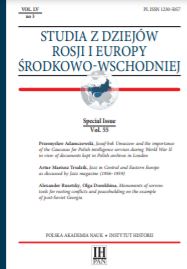Overrated and overlooked. The critical reception of Czechoslovak cinema in Poland in the 1950s and 1960s based on Karel Kachyňa’s Smugglers of Death
Overrated and overlooked. The critical reception of Czechoslovak cinema in Poland in the 1950s and 1960s based on Karel Kachyňa’s Smugglers of Death
Author(s): Karol SzymańskiSubject(s): Cultural history, Post-War period (1950 - 1989), Film / Cinema / Cinematography, History of Art
Published by: Instytut Historii im. Tadeusza Manteuffla Polskiej Akademii Nauk
Keywords: critical reception of films in Poland; Smugglers of Death (Král Šumavy); Karel Kachyňa; First Wave in Czechoslovak cinema; Polish film criticism; distribution of films in Poland; genre cinema;
Summary/Abstract: Polish film criticism had tended to react ambivalently and rather disparagingly to Czechoslovak films screened in Polish cinemas since the end of 1947, praising them for their technical aspects, a sense of realistic observation and dealing with the affairs of ordinary people, while on the other hand denouncing their “decrepit style,” “petit bourgeois” tendencies and “sluggish thinking.” A change in attitude took place in the late 1950s when Polish critics rapidly and perspicaciously noted the post-thaw revival symptoms in Czech film-making (treating them, however, as part of a wider, international “new socialist wave”). The films that met with the most lively welcome and garnered the highest scores in Polish press were not those classified as First Wave pictures (such as School for Fathers by Ladislav Helge, Hic Sunt Leones by Václav Krška, or At the Terminus by Ján Kadár and Elmar Klos), but rather such titles as Invention for Destruction by Karel Zeman or Romeo, Juliet and the Darkness and Wolf Trap by Jiří Weiss. Likewise, critics treated Karel Kachyňa’s Smugglers of Death, which came to Polish screens in 1960, as the leading achievement of Czechoslovak cinema, but focused on its entertainment and technical values (considering it a successful action film) while entirely glossing over its origin, ideological content and political message. Polish reviewers believed that Smugglers of Death satisfied the demand for attractive and quality entertainment cinema. Thus, a peculiar shift of emphasis and a certain mystification took place in the reception, as a result of which the film, belonging to a trend in the Czech cinema that revived the mood of suspicion, espionage obsession and confrontation with the West following the 1959 Banská Bystrica conference, was discussed in Poland mostly in terms of its genre and technique as a well-made thriller title. More importantly, however, the focus of journalist attention and high scores for the aforesaid “safe” works of Zeman, Weiss or Kachyňa “glorified” with film festival awards reflect the state of Polish film criticism of the late 1950s and early 1960s. In particular, it reveals the inclinations, reception modes, prophetical intuitions and anachronistic idées fixes of critics, which resulted in the profound misunderstanding, downplaying and overlooking of the novel First Wave works that woke Czechoslovak cinema from its slumber as it attempted to break out of the socialist realism mould through thematic and formal experiments that anticipated the emergence of the New Wave.
Journal: Studia z Dziejów Rosji i Europy Środkowo-Wschodniej
- Issue Year: 55/2020
- Issue No: Sp.
- Page Range: 75-102
- Page Count: 28
- Language: English

